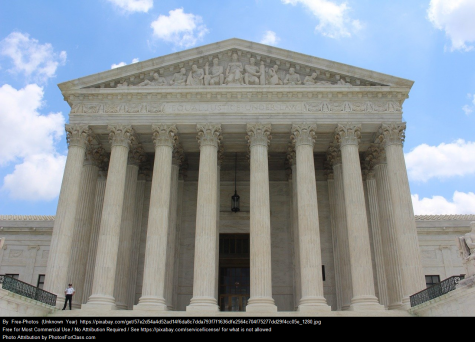Amy Coney Barrett’s status as Ruth Bader Ginsburg’s replacement is bad news for women’s rights in the United States
Amy Coney Barrett was elected as a Supreme Court Justice to pacify those saddened by Ruth Bader Ginsburg’s death. However, Barrett’s troubling past shows us that in her service Ginsburg will not live on like women’s rights activists had hoped
December 22, 2020
On September 18th 2020, the United States lost someone who many, especially members of the U.S. government, consider a legend: Supreme Court Justice Ruth Bader Ginsburg. Ginsburg served on the Supreme Court for 27 years after being appointed by Bill Clinton in 1993. She was the second woman to ever serve on the court, and she did in fact serve. Accomplishments we have Ginsburg to thank for include: the repeal of the Virginia Military Institute’s male-only admissions policy, the repeal of a 2013 Texan law restricting abortion providers in the state, and President Obama’s signing of the Lilly Ledbetter Equal Pay Act.
The list goes on when it comes to Ginsburg’s accomplishments for women and minorities. Understandably, these two parties in particular are concerned about what her death means in regards to their rights. After all, with her gone, the Court is made up of mostly white men. So, President Trump’s promise to elect female justice Amy Coney Barrett in her place should come as a relief.
Not exactly.
What’s even more important than having a female justice on the Court is having a justice who will fight for women’s rights. It’s easy to regard her status as a woman as a win for the feminist movement, but a brief look into her political beliefs makes it evident that her interests do not lie with the people she was intended to represent.
Barrett is openly against abortion rights. Not only has she publicly deemed the practice as being “always immoral,” she refuses to endorse Roe V. Wade, the decision of the Supreme Court that a pregnant woman is entitled to an abortion without excessive government restrictions. Barrett has in fact expressed interest in repealing the ruling altogether. Ginsburg, however, was an ambassador for abortion rights in America and largely influenced the rest of the Court’s attitudes towards the subject. She believed wholeheartedly that the “issue” of abortion lay mostly in the U.S. government’s desire to control a woman’s body. Clearly, Barrett doesn’t share that attitude.
Barrett has also, in the past, given speeches to alt-right pro-life groups such as the Right to Life club at the University of Notre Dame. In college she joined an anti-abortion rights faculty group. When asked about a letter she signed condemning Roe v. Wade’s legacy, she simply stated that the letter aligned itself with the beliefs of her church and that’s why she signed it. She’s been taking steps to eliminate abortion rights since before she had the power to actually do so. Now that she’s been handed said power, activists fear the worst for the fate of abortion rights in America.
Electing Barrett to ease people’s fears about Ginsburg’s death when, undeniably, their opinions and agendas are worlds apart is telling of how little women’s voices are valued in politics. To the Supreme Court, Ginsburg’s policies, activism and intellect seemingly meant nothing – what’s important to them is the fact that she was a woman. To them, electing another woman is “good enough” in upholding her legacy, even if that woman can’t name the five rights protected by the First Amendment.
The only thing that Ruth Bader Ginsburg and Amy Coney Barrett have in common is that they are both female. The biggest difference between the two is that Ginsburg fought for women’s autonomy over their own body, while Barrett actively expresses her contempt for said autonomy. Electing a woman to replace Ginsburg is not nearly enough. What we need on our Supreme Court is someone who will fight for women’s rights just as valiantly as Ginsburg, and with Barrett as her replacement, it appears that we won’t be getting that anytime soon.

